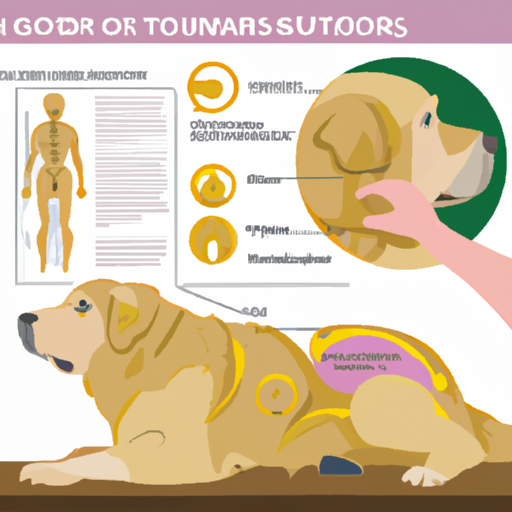Introduction
As a loving and attentive caregiver, you always want the best for your furry friends. You feed them, groom them, and ensure they get their daily dose of belly rubs. But what happens when you find a lump on their body? That lump could be a tumor, and it’s something that needs your immediate attention. But before we dive into the deep end, let’s better understand what tumors are.
What are Tumors?
Tumors are abnormal growths in your dog’s body. They can either be benign (non-cancerous) or malignant (cancerous). While benign tumors might not spread to other parts of the body, they can still cause discomfort and health problems if they grow large enough. Malignant tumors, on the other hand, can invade nearby tissues and spread throughout the body.
Common Causes of Tumors in Dogs
Understanding the causes of tumors can help you take preventive measures. Here are a few common causes:
-
Genetics: Some dog breeds are more prone to developing tumors. For instance, Boxers, Golden Retrievers, and Bernese Mountain dogs have a higher risk of certain types of cancer.
-
Age: Just like humans, dogs are more likely to develop tumors as they age.
-
Environment: Exposure to certain chemicals or harmful radiation can increase the risk of tumors.
| Dog Breed | High Risk of Tumor Type |
|---|---|
| Boxers | Mast cell tumors |
| Golden Retrievers | Lymphoma, hemangiosarcoma |
| Bernese Mountain Dogs | Histiocytic sarcoma |
How to Detect a Tumor in Your Dog
You know your dog better than anyone else, and that puts you in a unique position to notice any changes in their body or behavior. Look for these signs:
- Lumps or bumps on the skin
- Unexpected weight loss
- Changes in appetite
- Difficulty breathing
- Lethargy or depression
Prevention and Treatment
While you can’t always prevent tumors, certain actions may help reduce the risk:
- Regular vet check-ups: Early detection is key in managing tumors.
- Healthy diet: A balanced, nutrient-rich diet can help maintain your dog’s overall health.
- Regular exercise: Keeping your dog active can boost their immune system and help keep them healthy.
Treatment options for tumors in dogs can range from surgery to remove the tumor, chemotherapy, radiation therapy, and immunotherapy. The best course of action will depend on the type, location, and stage of the tumor.
Frequently Asked Questions
Q: Can tumors in dogs be prevented?
A: While there’s no surefire way to prevent tumors, regular vet check-ups, a healthy diet, and regular exercise can help maintain your dog’s overall health and potentially reduce risk.
Q: Are all tumors in dogs cancerous?
A: No, tumors can be benign (non-cancerous) or malignant (cancerous). A vet can determine the nature of the tumor.
Q: What should I do if I find a lump on my dog?
A: If you find a lump on your dog, schedule a vet appointment as soon as possible for an evaluation.
Remember, you’re not alone in this journey. There are numerous resources and support groups to help you and your furry friend navigate this challenging time. And most importantly, keep giving your dog all the love and care they deserve.



